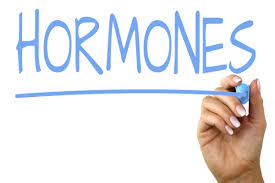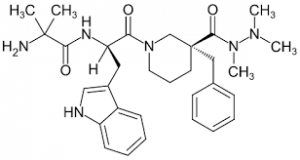How Hormones Control Hunger and Satiety
Hormones are chemicals that help your organs and systems communicate with one another. Without the influence of Hormones, humans and other complex life forms simply wouldn't exist. These tiny molecules are that important! Hunger seems like a simple concept at first glance—you need food to live, and your body tells you when it requires more calories. It seems so simple!
 Upon further consideration, however, hunger results from a complex symphony of hormones that all work together to direct your actions to meet your needs. The adrenal glands, parathyroid, thyroid, and pituitary are all centers of hormone production involved in the physiological processes behind hunger and satiety, along with the digestive organs. Let's talk about how hormones are involved in hunger.
Upon further consideration, however, hunger results from a complex symphony of hormones that all work together to direct your actions to meet your needs. The adrenal glands, parathyroid, thyroid, and pituitary are all centers of hormone production involved in the physiological processes behind hunger and satiety, along with the digestive organs. Let's talk about how hormones are involved in hunger.
Hormones Signal Both Hunger and Fullness
Hormones are deeply involved in all the processes influencing our eating patterns. Some encourage us to eat; others tell us when to stop. Hormone Imbalance can lead to both overeating and insufficient intake, along with increased body fat or weight loss. Signals that control eating patterns are modulated by both the nervous system and the endocrine system by electrical signals and hormones.
The following hormones are all critical to hunger response:
- Ghrelin is the hormone most widely known of the hormones associated with hunger it's frequently referred to as The Hunger Hormone. It activates feelings of hunger by stimulating the hypothalamus, the control center of the brain and body. Ghrelin also affects glucose metabolism, circadian rhythm, and other functions.
- Motilin is secreted by the small intestine and leads to contractions of the intestinal muscles, which are interpreted as hunger by the brain. This is one of the reasons that
 your stomach growls and rumbles when hungry.
your stomach growls and rumbles when hungry. - Neuropeptide Y (NPY) is controlled by leptin (the satiety hormone) and ghrelin. NPY is a short-chain hormone that encourages you to start eating. Its influence wanes as your intake increases.
- Agouti-related protein (AgRp) precedes the release of NPY. AgRp is released in response to Ghrelin's activity and encourages the hunt for food. As feeding begins, AgRp levels decline sharply, and NPY encourages continued eating.
The following hormones are related to fullness and slow down caloric intake:
- Cholecystokinin (CCK) is one hormone that stimulates the feeling of satiety. Protein and fat activate the release of CCK, but not carbohydrates. This is why fat and protein fill you up more quickly than starches and sugars. CCK also triggers gallbladder activity to process nutrients.
- Glucagon-like peptide-1 (GLP-1) is a hormone secreted by the intestines when you eat. GLP-1 tells your brain to slow down eating and feel more full. It also inhibits stomach emptying, allowing your body to process food more efficiently.
- Peptide YY is another intestinal hormone that controls hunger. It works by reducing appetite. It also slows down the rate at which the digestive tract processes food.
- Leptin is a very notable digestive hormone. Unlike the hormones listed above, Leptin is produced primarily by adipose cells (fat). It's released to signal to the brain that fat cells have accepted sufficient energy from the diet and that it's time to stop eating. Leptin affects the activity of several other hormones directly, stimulating other hormones associated with satiety and suppressing AgRp and NPY.
- Insulin is responsible for regulating glucose and sustaining healthy energy levels. Insulin transports energy from the food that we eat for storage. Insulin production increases directly after eating, and as needs are met, Insulin signals the brain to eat less.
- Obestatin is believed to act counter to Ghrelin, suppressing hunger. It's understood to be necessary for digestion, but its full effects are not yet fully understood.
How HGH and Testosterone Relate to Digestion and Body Fat
Each of these hormones plays a critical role in the Hormone Cascade associated with digestion. Testosterone and Human Growth Hormone also interact with the digestive system. Human Growth Hormone acts with Insulin to meet the body's energy needs. HGH Levels increase as hunger-inducing hormone levels increase.
HGH frees energy from fat cells for use by the body during lean times. Growth Hormone is also produced during periods of high exertion, supplementing calories from the diet.
Contact us for a FREE, no-obligation discussion about the benefits of hormone replacement therapy.
- 0001 Regular Physical Activity Will Boost Your Mood and Reduce Stress [Last Updated On: February 13th, 2025] [Originally Added On: December 31st, 2020]
- 0002 Ten Natural Ways To Reduce Anxiety [Last Updated On: January 4th, 2025] [Originally Added On: January 1st, 2021]
- 0003 Nbc News: Men's Magic Youth [Last Updated On: April 13th, 2025] [Originally Added On: January 2nd, 2021]
- 0004 My Own Experience With Human Growth Hormone (case Study) [Last Updated On: January 3rd, 2025] [Originally Added On: January 3rd, 2021]
- 0005 Treating Polio Virus and Post Polio Syndrome With Human Growth Hormone Injections [Last Updated On: January 8th, 2025] [Originally Added On: January 4th, 2021]
- 0006 The Influence Of HGH on Bone Mineral Density And Bone Health [Last Updated On: February 14th, 2025] [Originally Added On: January 5th, 2021]
- 0007 Outline Of The Benefits Of Human Growth Hormone [Last Updated On: January 3rd, 2025] [Originally Added On: January 6th, 2021]
- 0008 Eight Tricks To Relieve Inflammation [Last Updated On: February 19th, 2025] [Originally Added On: January 7th, 2021]
- 0009 Tips and Tricks on How to Naturally Lower Your Blood Pressure [Last Updated On: January 13th, 2025] [Originally Added On: January 8th, 2021]
- 0010 When Is the Best Time to Start HGH Treatment? [Last Updated On: October 20th, 2025] [Originally Added On: October 11th, 2021]
- 0011 How Fast Can I Get Results With HGH Therapy? [Last Updated On: April 15th, 2025] [Originally Added On: October 23rd, 2021]
- 0012 New Brain Receptor Found that Could Help Keep Our Minds Healthier Longer [Last Updated On: February 14th, 2025] [Originally Added On: May 17th, 2022]
- 0013 A Medical Doctor Tries Human Growth Hormone In 1992 [Last Updated On: February 14th, 2025] [Originally Added On: May 19th, 2022]
- 0014 It’s Amazing! Bible Hero Noah and HGH [Last Updated On: October 21st, 2025] [Originally Added On: December 13th, 2022]
- 0015 How Can I Tell if I Have a Hormone Deficiency? [Last Updated On: February 19th, 2025] [Originally Added On: January 10th, 2023]
- 0016 Is HGH the Miracle Therapy that Countless People have Been Waiting for all Their Lives? [Last Updated On: March 7th, 2025] [Originally Added On: January 25th, 2023]
- 0017 County Lineman Gets His Life Back [Last Updated On: April 21st, 2025] [Originally Added On: February 10th, 2023]
- 0018 Abused Woman Discovers the Power of Hormone Replacement Therapy [Last Updated On: April 10th, 2025] [Originally Added On: March 1st, 2023]
- 0019 Which HGH Booster or HGH-boosting Supplement Should I Buy? [Last Updated On: April 18th, 2025] [Originally Added On: March 17th, 2023]
- 0020 Scene from an As-Yet Unreleased Documentary: “I was Suffering, and I Didn't Know I Had an HGH Deficiency” [Last Updated On: April 29th, 2025] [Originally Added On: May 17th, 2023]
- 0021 Human Growth Hormone Improves the Immune System [Last Updated On: May 2nd, 2025] [Originally Added On: June 9th, 2023]
- 0022 What Happens if You Forget a Dose? [Last Updated On: August 15th, 2025] [Originally Added On: August 23rd, 2023]
- 0023 What Scientists Successfully Synthesized Human Growth Hormone (HGH) for the First Time? [Last Updated On: September 7th, 2025] [Originally Added On: September 18th, 2023]
- 0024 Identifying Hormonal Deficiency: Common Symptoms [Last Updated On: February 19th, 2025] [Originally Added On: February 11th, 2025]
- 0025 The Potential of HGH as a Life-Changing Therapy [Last Updated On: March 3rd, 2025] [Originally Added On: March 3rd, 2025]
Word Count: 712






